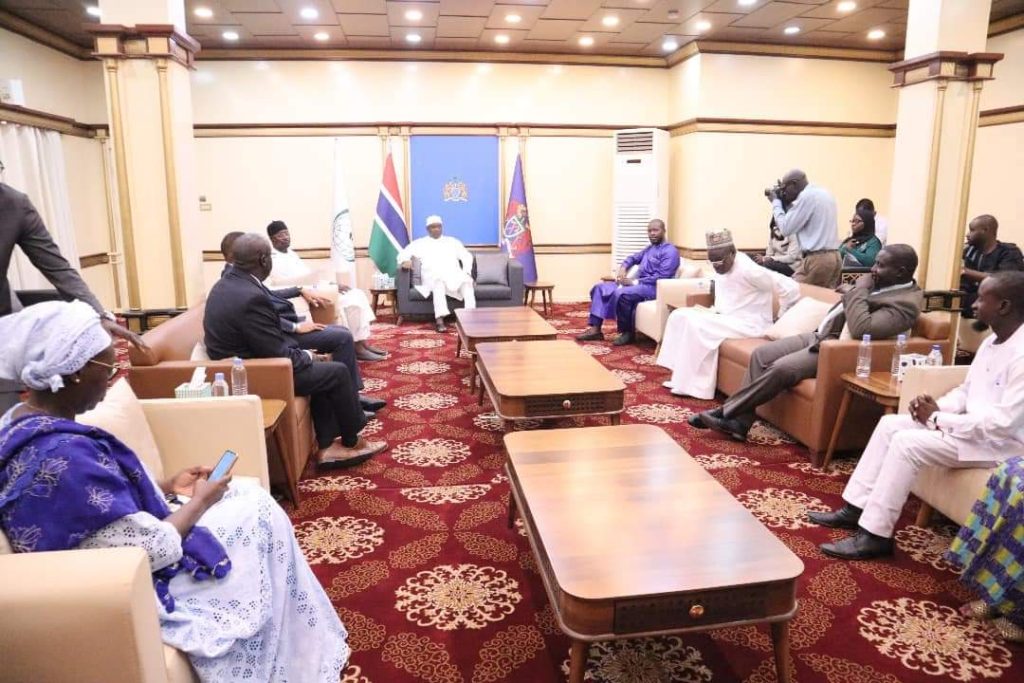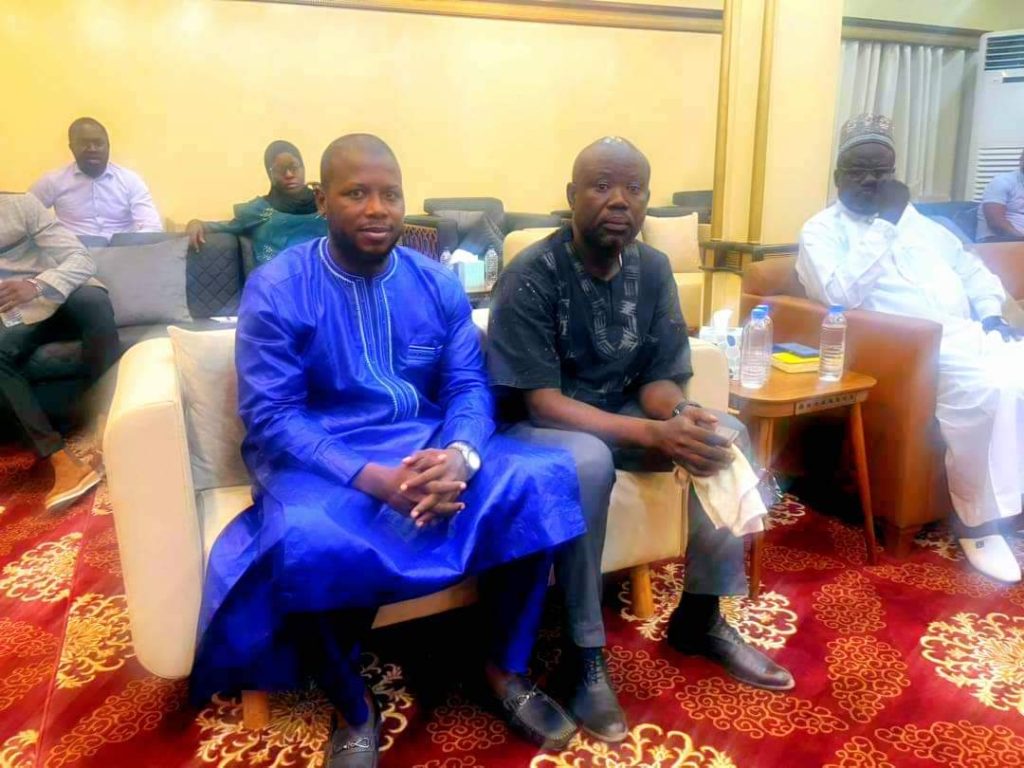By Arfang Madi Sillah, Washington D.C
The recent clash between President Adama Barrow and The Voice newspaper reads like a sordid tale straight from the annals of British political melodrama, reminiscent of the scandalous intrigues of Fleet Street. Here we find all the elements of a Victorian penny dreadful: political offense, journalistic bravado, and a sudden strategic retreat. What began as a bold confrontation between a state striving to rein in what it deemed the excesses of a “wayward” press, has dissolved into a private, unsavory truce, wherein principles are bartered like coins and courage is found to be little more than a faded illusion. This was no clash of titans, nor a righteous contest over the boundaries of freedom; it was a masquerade, performed before the Gambian public, whose role as spectators is to be pitied, for they were offered a tale of confrontation only to find themselves in the midst of a play on compliance.

From the start, the affair bore the hallmarks of farce. The controversy began with a single, unremarkable article, a feeble report that claimed, with nary a wisp of substantiation, that President Barrow was quietly grooming a successor for the upcoming 2026 election. In its lack of diligence, its carelessness with the facts, the report bore an uncanny resemblance to those shoddily composed pamphlets that once littered Grub Street, tales spun by scandal-mongers for a pittance, with no more loyalty to truth than a penny dreadful editor might show to his dubious readers. It was a tale of no integrity and little effort, rushed to press without the faintest shadow of verification—a piece as unmoored from evidence as the wild imaginings of Sterne’s Tristram Shandy or the chaotic jottings of Dickens’s Mr. Micawber, with hopes pinned on “something turning up.” It seemed less a report and more an exercise in mischief-making, suited for little more than a moment’s amusement before being consigned to the oblivion of forgotten newsprint. And yet, as reckless as it may have been, the article was still a product of a free press, bearing the inalienable right to speculate and to err, even if that freedom occasionally results in folly.
But even as they exercise this right, those who publish are, as Robert Louis Stevenson astutely observed in The Dynamiter, “bound in honor to give a clear account.” When an error is made, when the facts prove false or the narrative skewed, the responsible press must step forward to acknowledge its failings, to correct the record and restore public trust. Here, however, we find ourselves in a more treacherous landscape. For when the President’s office, claiming misrepresentation, demanded accountability, The Voice was faced with a simple, clear choice: offer a right of reply, a platform for rebuttal, or issue a correction, a gracious acknowledgment of error. Either path would have signaled a commitment to journalistic integrity, a willingness to place truth above mere reputation. Yet, in a move as baffling as it was audacious, The Voice chose neither. Instead, it dug in its heels, issuing a declaration as bold as it was premature: “we stand by our report.” Here, for a brief moment, it appeared as though the Gambian press had taken on the defiant spirit of old Fleet Street, that bastion of unbending independence where editors wielded their pens with a warrior’s resolve, sparing neither prince nor pauper in their pursuit of truth. With that single, firm statement, The Voice rallied those who believe in a press unafraid to challenge authority, evoking the noble specter of a press that would not be cowed, a press that would echo Milton’s call to “let truth and falsehood grapple” in an open forum.

Yet this show of strength, like the thin sheen of virtue that hides the conniving hearts in Thackeray’s Vanity Fair, was but a veneer—a brave face quickly abandoned when the heat of authority drew near. For when called to meet with President Barrow himself, the editors of The Voice abandoned their defiant stance with a speed that belied any real commitment to principle. The very paper that had so publicly affirmed its belief in the veracity of its story now meekly offered an apology, acknowledging the errors they had previously stood behind with such unyielding conviction. In that single act of submission, The Voice transformed from a symbol of resistance to a disappointing spectacle, its brave stance exposed as hollow bravado, more akin to the servile hypocrisies of Dickens’s Uriah Heep than to the steadfast resolve of a principled press. The apology was not the act of a press committed to truth; it was an act of concession, a calculated submission dressed in the language of regret. For those of us who had defended The Voice, who had seen in its defiance a glimmer of hope for an independent Gambian press, this was a profound betrayal, a disheartening reminder that what we had taken for strength was in fact little more than feigned resolve.
Thus, the supposed clash of ideals reveals itself as a mere performance, a play in which The Voice’s earlier declaration of integrity was but a line in a script, rehearsed for effect and discarded as soon as the pressure mounted. The paper’s reversal was not only disappointing; it was a betrayal that laid bare the limits of its conviction, unveiling a press less interested in pursuing truth than in preserving its own tenuous safety. In that one moment of capitulation, The Voice transformed from a symbol of journalistic courage to a vessel of hollow words, offering us not the unbending integrity of George Eliot’s Dorothea but the malleable posturing of Trollope’s Mr. Slope, who preaches righteousness while courting convenience. Here was no Fleet Street lion; here was a reed swayed by the faintest breeze, its promises of fortitude dissipating in the face of authority’s displeasure.
And while The Voice may have retreated, leaving its supporters adrift, there remains yet another question—a question of integrity that stretches beyond the bounds of mere words and into the realm of finances, of the honor—or lack thereof—imbued in the handling of funds. For we are left to wonder about the sums purportedly collected by Ida Drammeh & Associates, the President’s legal counsel, who supposedly prepared for a grand battle in court and yet now find themselves with a substantial fee for a trial that was never meant to be. If there exists a modicum of dignity within the firm, it would behoove them to return a portion of those fees, acknowledging that the battle for which they were paid has vanished into thin air. Would it not be a noble gesture to channel these funds toward scholarships for Gambian students or other public initiatives? By directing these resources toward a greater cause, the firm could salvage some measure of respect, proving that even in the harsh world of legal advocacy, a commitment to justice and public good might transcend the pursuit of profit.
And what of The Voice? For it, too, must answer the charge of funds supposedly raised under the banner of defending “freedom of the press.” When private media lock horns with political power, it is not uncommon for international bodies and patriotic citizens to rally behind the beleaguered press, donating in the hope of fortifying their stand. Yet, if The Voice collected donations to wage a legal defense and then settled the matter quietly, what right does it have to retain such contributions? To keep these funds would be to betray the trust of every supporter who believed their money was going toward a noble cause, a cause of defending the press’s role in democracy. If The Voice has any true regard for its patrons, it would see fit to return these funds or redirect them to causes that genuinely serve the public. To do otherwise would reduce the lofty ideal of free expression to nothing more than a convenient pretext for profit, rendering the paper no more a defender of press freedom than a mere opportunist.
This entire episode should serve as a sobering reminder to Gambians and international donors: not every call for support is sincere, and not all who claim to fight for the public good are driven by noble intentions. As Hardy’s Far from the Madding Crowd suggests, “It is difficult for a woman to define her feelings in language which is chiefly made by men to express theirs,” so too is it difficult for the press to speak truth when its language is shaped by political influences. If The Voice and Ida Drammeh & Associates have any commitment to transparency, they must return funds gathered under false pretenses, proving that their loyalty lies with the Gambian people and not with their own wallets. Without this act of accountability, they risk becoming precisely what they claim to oppose: opportunists cloaked in the garb of public servants, using the ideals of democracy as a façade for personal gain.
Disclaimer:
The views expressed in this article are solely those of the author and do not necessarily reflect the official policy or position of any affiliated institutions or organizations. The author takes full responsibility for the opinions and analysis presented herein. The author holds several academic degrees, including an advanced degree in International Relations from the Helms School of Government at Liberty University, Virginia, United States of America.

